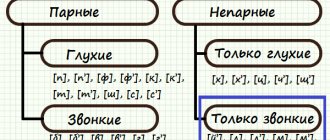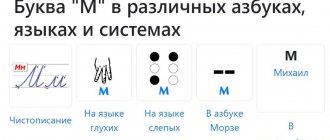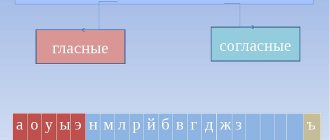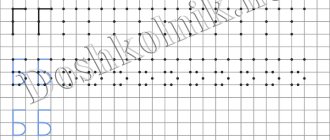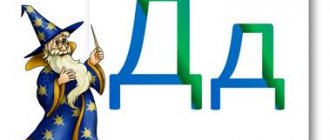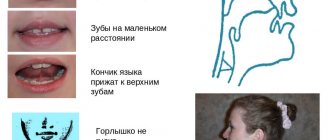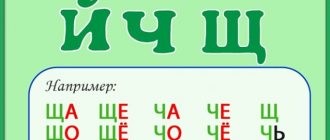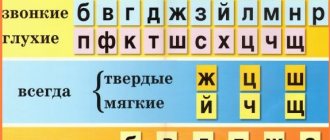Today we are with the letter... or rather, the letter Z is with us.
What do we know about the letter Z? Only that this letter is contained in the Russian alphabet and occupies eighth place in it.
Other languages also have this letter, but not all.
This letter did not exist in either Latin or Greek.
But some languages can boast that thanks to this letter Ж they formed other letters, for example, Ӂ or Җ.
Their spelling is similar, but there are some distinctive signs. One on top, like our Y, the second has a tail at the bottom, similar to Shch.
Such transformations occurred in a number of non-Slavic languages.
The name of the letter in Church Slavonic and Old Slavonic dialects is interesting. This letter is called “live”, as if it orders everyone to live (not to bother).
Examples of words starting with the letter “F”
#WordsWords starting with the letter “F” Beetle, toad, frill, jasmine, heatWords ending with the letter “F”Beige, siskin, knife, husbandWith the letter “F” in the middle of the wordAlready, jazz, hedgehog, rain, budgetWords containing several letters “F” Thirst, yeast, thirsty, reinsCountries—CitiesGeneva, Zhitomir, Zheleznovodsk. See all cities starting with the letter “F”AnimalsToad, giraffe, crane, beetle, pearl mussels. See all animals starting with the letter “F” Vegetables, fruits and berries—Professions: Railway worker, journalist, juggler, jockey, painter. View all professions starting with the letter “F” All names starting with the letter “F” with meanings and origins Male names Jean, Georges, Gerard. See all male names starting with the letter “F”, as well as their meaning and origin. Female names Josephine, Zhanna, Jasmine. See all female names starting with the letter “F”, as well as their meaning and originHistory of the occurrence of F
The mysterious origin of the letter Zh convinces us that, as a sound, Zh is not primary, i.e. it did not originally exist in the language, but was formed from other consonants as a result of their palatalization, i.e. mitigation.
This was at the origins of the common Slavic language.
And although the very appearance of F occurred in the process of softening the consonants, the sound is considered hard.
In addition, J is assimilative to Z and S: to crush [to crush], to fry [to fry], with a wife [to burn], etc.
It is very difficult for foreigners to pronounce this sound due to the peculiarities of the speech apparatus. Therefore, when someone wants to pretend to be a foreign-language citizen, they deliberately pronounce not “horror”, but “ushas”, not “heat”, but “shara”.
In European languages, to approximately depict F, they use letter combinations:
- in French, j is placed before the vowel and you get, for example, Jean - Jean or put G - Gem, etc.;
- in English also j - John. But if a German wants to read this name, he will say “Jon” instead of John.
Such combinations often transform words depending on the language of the speaker.
Russian Ivan in Germany suddenly becomes Johann, in France the same Ivan suddenly becomes Jean, and in England - John, in Spain - Juan... And all this is our Russian Ivan with his name written in different combinations of letters.
Sometimes we get very funny situations with names. A German who cannot pronounce J can call Jean Shan, and when he sees how his name is written, he will read Jan in his own German way. And this is Jan, i.e. Jean.
A Frenchman will read Don Juan as Don Juan, although in Spanish it is Don Juan.
This is exactly how we are used to pronouncing this name. But Pushkin went the furthest. He named the character Don Juan.
Study Materials
Poetry
* * * “F” has so many legs, as if the letter could crawl. The letter "F", for sure, is the shadow of a beetle on the paper.
Poems about the letter "F"
Puzzles
* * * Zhenya was playing around in the blinds: Opening and closing, giving them no rest. But they were already saved - They turned into a letter...
Riddles about the letter "F"
Tongue Twisters
* * * The beetle and the beetle did not grieve, They were close friends with the letter Z. The letter Z came to them, taught them to buzz.
Tongue twisters starting with the letter “F”
Fairy tales
Staging F
To pronounce the sound Zh, correct articulation is important. The lips, tongue, hard and soft palates, and vocal cords are involved in the creation of sound:
- The lips are rounded, the mouth is not opened too wide, the teeth are located at a short distance from each other.
- The tongue is wide, raised to the edge of the hard palate (right behind the upper teeth). Its middle part is lowered, and the sides are raised and pressed firmly against the teeth.
- The back of the back of the tongue is raised and pulled back. A strong directed air stream passes between it and the sky. The soft palate is raised, blocking the passage into the nasopharynx.
- The vocal cords vibrate.
Speech therapy profile of sound F
Basic principles of transliteration
The phonetics of the English language is in general similar to the phonetics of the Russian language. And in most cases, there are no problems with transliteration, because approximately half of Russian letters are transferred into English quite easily and without variations. For example , Bb - Bb, Pp - Pp, Ff - Ff . But there are also differences, because many Russian sounds, such as “Ch-Shch”, “Zh-Sh”, etc., have no analogues in the English alphabet. And this is not surprising, because the English alphabet consists of 26 letters, and the Russian one - of 33. Unfortunately, it should be noted that there is no single transliteration system; there are different opinions and disagreements on this issue.
At the moment, there are several GOSTs (for example, GOST 7.79-2000, GOST R 52535.1-2006) and even two ISO standards (ISO 9:1995, ISO/R 9-1968), which are used when filling out various international forms, questionnaires, documentation (foreign passport, driver’s license, etc.) and are used for transliteration of the Russian alphabet. What is noteworthy is that the use of a certain system is prescribed by the organization that carries out the transliteration.
So, how to write the letter “F” in English .
According to GOST 7.79-2000 (functioning in the Russian Federation since 2002), the letter “Zh” in Latin can be written in two ways:
- with diacritic symbol - ž.
- by connecting Latin letters - ZH, zh.
According to GOST R 52535.1-2006, the letter “Zh” is also written in Latin letters - ZH, zh.
Features of writing “F” in English
In some cases, another spelling is possible:
- O is sometimes denoted by the letter "G". But this version of spelling is acceptable provided there are vowels “i”, “e”, “y” after “G”, and does not apply to borrowed words. In these cases, “G” will be read softer, like “DZh,” but not “F.”
- Many people use the letter “J” to write the Russian letter “Zh”, but this is fundamentally wrong, because it is read more like “J”, for example, Jamal (Jamal), and sometimes as “th”, for example, Julia - Julia, Yulia. And it is used in words borrowed from Latin. Also this variant of "J" for "Zh" was based on the French alphabet (as in Soviet-style documents). For example, Anjela (Angela). But o should be used instead of “F” when writing an international telegram, which should be written in Latin letters (according to the “Instructions on the procedure for processing international telegrams in post offices”, which was adopted by the Ministry of the Russian Federation for Communications and Information in 2001).
Translit without any problems
Currently, transliteration of Russian words into English is available online on many Internet services, for example, the free “Transliteration” service. In this case, writing a Russian word in English does not present any difficulties. To do this, simply enter or copy the required text into the text area and click the “Transliteration” button. The entered text is automatically displayed in Latin letters. In this way, it is quite convenient to check your personal data in Latin before filling out the documents.
Meaning of the word
To draw a straight line, it is enough to mark only two points. In 1920, as Ehrenburg recalls, the Cheka posed the question to him this way: “prove YOU that you are not an agent of Wrangel.” And in 1950, one of the prominent colonels of the MGB, Foma Fomich Zhelezov, announced to the prisoners: “We will not bother to prove his guilt to him (the arrested person). Let him prove to us that he had no hostile intentions.” And in between, countless memories of millions fit into this cannibalistic, simple straight line. What an acceleration and simplification of the consequences, unknown to previous humanity! The authorities generally freed themselves from the trouble of looking for evidence! A caught rabbit, shaking and pale, not having the right to write to anyone, call anyone on the phone, bring anything from the outside, deprived of sleep, food, paper, pencil and even buttons, seated on a bare stool in the corner of the office, must find it and lay it out in front of the slacker. - the investigator provided evidence that he did NOT have hostile intentions! And if he didn’t look for them (where could he get them?), then he thereby brought to the investigation approximate evidence of his guilt! I knew a case when one old man, who had been in German captivity, nevertheless managed to sit on this bare stool and spread his bare fingers, to prove to his monster interrogator that he had NOT betrayed his homeland and did not even have such an intention! Scandalous incident! Well, he was released? No matter how it is! - he told me everything in Butyrki, not on Tverskoy Boulevard. The second investigator then joined the main investigator, they spent a quiet evening of memories with the old man, and then the two of them signed witness statements that that evening the hungry old man, who was falling asleep, was conducting anti-Soviet agitation among them! It was said in vain, but it was not in vain that it was listened to! The old man was handed over to a third investigator. He dropped the unfounded charge of treason against him, but carefully gave him the same ten for anti-Soviet agitation during the investigation. Having ceased to be a search for truth, the investigation became for the investigators themselves in difficult cases - serving executioner duties, in easy cases - a simple pass of time, the basis for receiving a salary. But there were always mild cases - even in the notorious 1937. For example, Borodko was accused of having gone to visit his parents in Poland 16 years earlier and then not taking a foreign passport (and his mother and father lived ten miles away from him, but the diplomats signed that Belarus to be given to Poland, and the people in 1921 We weren’t used to it and still drove in the old way). The investigation took half an hour: did you go? - went. - How? - yes on a horse. — Received 10 years of the KRD!
Gulag Archipelago
Articulation gymnastics
It is important to prepare the child’s articulatory apparatus for mastering a new, difficult sound; for this you need to select the appropriate set of exercises:
- “Tongue-spatula”: we invite children to place a wide, relaxed tongue on their lower lip and hold it in this position for about a minute. “The tongue sleeps peacefully, like a spatula lies”
- “Painting the ceiling”: the mouth is open, the wide tongue rises to the sky and makes movements “back and forth”. “We are whitening and painting the ceiling, the tongue helped us with that!”
- “Delicious jam”: we raise our wide tongue to the upper lip, “lick” an imaginary delicacy from it. “We’ve worked, we’re tired, isn’t it time to refresh ourselves?”
- Calyx: The mouth opens wide, the tongue cups and moves forward slightly. “We need to quickly drink tea and go to the toys!”
Progress of the lesson:
Organizational moment (carried out on the carpet).
Guys, I suggest you work out with beetles today... Do you agree? Draw flying beetles, sleeping beetles, cheerful, offended beetles.
Report the topic of the lesson.
Guys, guess the riddle.
Six legs without hooves, flies and buzzes, falls, crawls into the ground. (Bug)
To find out what sound and letter we will get acquainted with today, answer me the following questions:
- What do you call a little beetle? (bug).
- And if there are several beetles, what should we call them? (beetles).
- Beetle, bugs, bug... What is the first sound you hear in words? (children's answers).
Right! Today we will listen and pronounce the sound “Zh”, and also get acquainted with the letter Zh.
Characteristics of the sound “Zh” according to articulatory and acoustic characteristics.
When pronouncing the sound “Zh”, the tip of the tongue rises behind the upper teeth, the teeth are brought together, the lips become a “mouthpiece”. Take the mirrors and try to pronounce the sound with me: zhzhzh...
Is it a vowel or consonant sound? Can you sing it? What prevents you from singing the sound “Zh” easily and freely? (children's answers).
This sound is very similar to the buzzing of a beetle, say it to me again, but looking in the mirror at your tongues...quietly...loudly (at this time a three-dimensional figure of a beetle appears on the fishing line.
Answer, is this sound a consonant or a vowel? Is he voiced or deaf, what do you think?
Prove why with your answer. Yes, this sound is consonant, sonorous. It is always pronounced firmly. When pronouncing the sound “Zh”, the tongue is in the form of a “cup” and raised to the upper teeth, the lips are rounded, the teeth are slightly open, brought together, the air stream is strong and warm (several answers repeated by children).
Pronunciation of sounds in syllables and words.
The beetle buzzed and buzzed and became bored. We can help him, we will “make friends” with vowel sounds. Name them (answers). The speech therapist “throws” a vowel sound, and the children return the ball, but to this vowel they add a consonant sound with which they have just become acquainted (they can pronounce both forward and backward syllables).
And now the next task: “Complete the syllable.” We continue to introduce the sound “Zh” to future friends. If we add the sound “K” to the syllable ZHU, what word will we get? (answers).
I suggest composing words with the sound “Zh”. I will name the first syllable, and you will name the next ones, but so that it turns out a word with meaning: ZHA....(BA), ZHI...(RAF), U...(ZHI), E...(ZHIHA), etc.
Come up with nicknames for our heroes, for example: BEETLE ZHUZHIK, GIRAFFE ZHORA, TOAD ZHUZHA, HEDGEHOG DOJA.
Well done!
Fizminutka
“Beetles” (teacher shows movements to music).
The beetle buzzes about the letter Zh, (imitate the work with its wings) The mischievous letter Zh, (jump on their legs alternately) She was offended: zhzhzhzh, (crouched down, covered herself with wings) She left zhzhzhzh, (movements of a locomotive) Arrived zhzhzhzh, (movements of a flying airplane) And zhzhzhzh with jasmine, (imitate breaths) Enjoyed the zhzhzhzh, (smile) This is the letter Zh, (working with wings) Naughty letter Zh. (E. Rybak)
(accompanied by the pronunciation of the sound in sentences by the teacher).
Introducing and analyzing the writing of the printed letter Z (a stylized and printed letter Z is displayed, children examine the letter B drawn in objects).
You named a lot of words with the sound “Zh”, and now I suggest you look at what the letter Zh looks like, what elements does it consist of? (children's answers).
Work in notebooks (outline the letter, color it in different ways, complete the drawing, etc.)
Memorizing a poem about a letter (repeat together, one at a time).
This letter is wide AND looks like a beetle. And at the same time, like a beetle, it makes a buzzing sound: F..f..f..f..f..f! (S. Marshak).
Each of you has our assistants, massage balls, on the table, I suggest you stretch your fingers. (hand massage using massage balls).
They lay out a letter from small paper bugs, paint a stencil of a printed letter in notebooks, find the letter in a cut-out alphabet, and name it.
Project “City of Letters” - all about the letter “Zh” for 1st grade
Project goal: To get acquainted with all the letters of the Russian alphabet and choose your favorite letter.
Draw and talk about her character, as well as behavior in the City of Letters, having learned about her from the works of the textbook “Literary Reading”. Make a letter layout, prepare a report for a speech and a presentation with illustrations. Project execution plan:
- My favorite letter
- Let's make a letter layout from cardboard.
- Character of the letter "Zh".
- Poems about the letter "F".
- Riddles about the letter "F".
- Text about the letter “F” for the Museum of Letters.
- An example of a finished presentation.
Report to the project
I chose the letter “F” for the Museum of Letters. Because she is my favorite. Various writers have said a lot of interesting things about this letter.
The word Zhuk begins with the letter Zh, which means an insect sitting in a box in V. Danko’s poem.
The letter Zh is a consonant and cannot be sung, but it can be hummed perfectly.
In M. Boroditskaya's poem, the letter Z is mentioned many times. It is in the words Stung, Terrible, Needed, Dinner.
In S. Marshak's poem, the word Giraffe, who pulled the bus bell, begins with the letter Z.
Also, the words Pity, Pathetic, Liquid begin with this letter.
